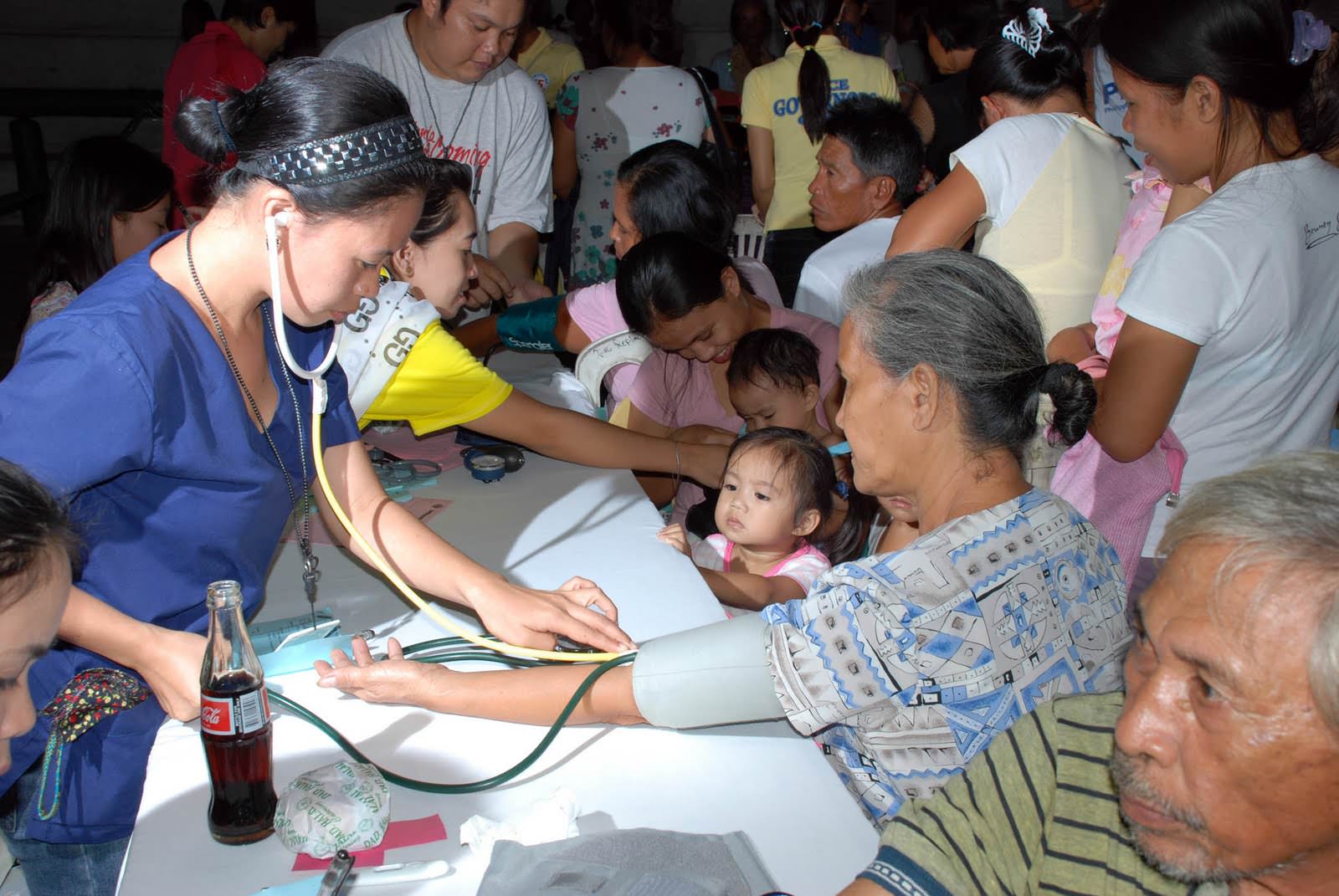Home>Misc>Featured>In What Way Can A Health Care Worker Demonstrate Commitment?


Featured
In What Way Can A Health Care Worker Demonstrate Commitment?
Modified: January 2, 2024
Learn how a health care worker can demonstrate commitment in their profession in this featured article.
Introduction
A healthcare worker plays a critical role in providing care and support to patients in various healthcare settings. From doctors and nurses to technicians and therapists, these professionals work tirelessly to ensure the well-being and recovery of their patients. But beyond their technical skills and knowledge, what truly sets a great healthcare worker apart is their unwavering commitment to their profession and to their patients.
Commitment in healthcare goes beyond simply showing up for work and carrying out tasks. It is about having a deep sense of responsibility and dedication to providing the best possible care. In this article, we will explore the various ways in which a healthcare worker can demonstrate their commitment to their profession and the people they serve.
Whether it’s upholding ethical standards, continuing education, or providing quality care, a committed healthcare worker goes the extra mile to ensure that they are constantly improving and delivering the highest level of service. They are not just in it for a paycheck; they genuinely care about the well-being and satisfaction of their patients.
By understanding and embracing the core values of commitment in healthcare, healthcare professionals can make a significant impact on the lives of their patients and contribute to the overall improvement of the healthcare system.
In the following sections, we will delve deeper into the various ways in which a healthcare worker can demonstrate their commitment.
Upholding Ethical Standards
One of the fundamental ways in which a healthcare worker demonstrates commitment is by upholding ethical standards. Healthcare professionals are entrusted with the well-being and lives of their patients, and it is their responsibility to ensure that they provide care that is guided by ethical principles.
Integrity is at the heart of ethical standards in healthcare. Honesty, transparency, and accountability are essential traits that a committed healthcare worker possesses. They maintain the highest level of integrity in all aspects of their profession, from accurately documenting patient information to providing unbiased and evidence-based care.
Respecting patient autonomy is another crucial aspect of upholding ethical standards. A committed healthcare worker recognizes and respects the rights of their patients to make informed decisions about their healthcare. They involve patients in the decision-making process, providing clear and concise information that allows them to make choices that align with their values and preferences.
Confidentiality is another key ethical aspect that healthcare professionals must uphold. A committed healthcare worker understands the importance of respecting patient privacy and maintaining the confidentiality of patient information. They ensure that patient data is securely stored and accessed only by authorized individuals.
In addition to these key principles, a committed healthcare worker also demonstrates ethical commitment by advocating for vulnerable populations and promoting social justice within the healthcare system. They recognize the inequalities and disparities that exist in healthcare and work towards addressing them, ensuring that all patients receive equitable and quality care.
By upholding ethical standards, a healthcare worker not only earns the trust and respect of their patients but also contributes to the overall integrity and reputation of the healthcare profession.
Continuing Education and Professional Development
A committed healthcare worker understands the importance of continuous learning and professional development. They recognize that in order to provide the best possible care, they must constantly update their knowledge and skills to stay abreast of the latest advancements in their field.
Continuing education is not just a requirement for maintaining licensure; it is a way for healthcare professionals to enhance their competence and expand their scope of practice. By pursuing additional certifications, attending conferences, participating in workshops, and engaging in self-directed learning, a committed healthcare worker demonstrates their dedication to staying current and providing evidence-based care.
Professional development goes beyond acquiring new knowledge; it also involves refining existing skills and acquiring new ones. A committed healthcare worker seeks out opportunities for skill development, whether it’s learning new medical procedures, improving communication and leadership skills, or mastering the use of new technology and equipment.
Engaging in continuing education and professional development not only benefits the healthcare worker but also directly impacts patient care. By staying up to date with advancements in medical research, treatment protocols, and best practices, healthcare professionals can provide more accurate diagnoses, implement effective treatment plans, and deliver better outcomes for their patients.
A committed healthcare worker understands that learning is a lifelong process and embraces opportunities to expand their knowledge and skills throughout their career. They actively seek out mentorship, participate in peer-to-peer learning, and collaborate with interdisciplinary teams to broaden their perspectives and enhance their abilities.
Moreover, a committed healthcare worker recognizes that professional development goes beyond clinical skills. They engage in activities that promote personal and professional growth, such as improving communication skills, building leadership capabilities, and fostering emotional intelligence.
By prioritizing continuing education and professional development, healthcare professionals not only enhance their own career prospects but ultimately contribute to the improvement of the healthcare system as a whole.
Providing Quality Care
At the heart of a committed healthcare worker’s dedication is the commitment to provide quality care to their patients. Quality care encompasses a multi-faceted approach that involves not only clinical excellence but also empathy, compassion, and personalized attention.
A committed healthcare worker strives for excellence in all aspects of care delivery. They stay updated with the latest medical guidelines and evidence-based practices to ensure that they provide the most effective treatments and interventions. They follow standardized protocols and best practices to minimize errors and improve patient outcomes.
In addition to technical skills, a committed healthcare worker also understands the importance of effective communication. They listen attentively to their patients, value their input, and respond to their concerns and questions in a clear and concise manner. By establishing a strong patient-provider relationship built on trust and respect, a committed healthcare worker can better understand their patients’ needs and provide care that aligns with their values and preferences.
Furthermore, a committed healthcare worker recognizes the importance of holistic care. They consider not just the physical health of their patients but also their emotional, mental, and social well-being. They take the time to assess and address the emotional and psychological needs of their patients, and they collaborate with other healthcare professionals, such as social workers or therapists, to provide comprehensive care.
Advocacy is another aspect of providing quality care that a committed healthcare worker embraces. They advocate for their patients, ensuring that their voices are heard and their rights are protected. They work to eliminate healthcare disparities and promote equitable access to care for all individuals.
Lastly, a committed healthcare worker actively seeks feedback from their patients and their colleagues to continuously improve the quality of care they provide. They embrace a culture of learning and accept constructive criticism as a means of personal and professional growth.
By providing quality care, a committed healthcare worker not only contributes to the well-being and satisfaction of their patients but also strengthens the overall healthcare system by improving patient outcomes and promoting patient safety.
Advocating for Patients
A committed healthcare worker understands the importance of being a strong advocate for their patients. Advocacy goes beyond providing direct care; it involves speaking up for the rights and well-being of patients, ensuring they receive the best possible care and treatment.
One aspect of patient advocacy is ensuring that patients have access to the necessary resources and services they need for their healthcare. A committed healthcare worker helps patients navigate the complex healthcare system, assists them in understanding their insurance coverage, and connects them with community resources that can support their overall well-being.
Furthermore, a committed healthcare worker is not afraid to challenge the status quo and advocate for systemic changes. They recognize the disparities and inequalities that exist in healthcare and work towards improving healthcare policies and practices to ensure equitable access to care for all patients.
Patient empowerment is another crucial aspect of advocacy. A committed healthcare worker involves patients in their care decisions, ensuring they have the necessary information and support to make informed choices about their health. They encourage patients to ask questions, voice their concerns, and actively participate in their healthcare journey.
In addition to supporting individual patients, a committed healthcare worker also advocates for public health initiatives and preventive measures. They actively promote vaccination campaigns, educate patients about healthy lifestyles, and engage in community outreach programs to raise awareness about disease prevention and early detection.
A committed healthcare worker is also mindful of the unique needs of vulnerable populations and marginalized communities. They recognize the social determinants of health and strive to address them through advocacy and support services.
By advocating for patients, a committed healthcare worker ensures that the voices of their patients are heard and respected. They work to eliminate barriers to care, promote patient-centered care, and uphold the rights and dignity of every individual.
Collaborating with Healthcare Team
A committed healthcare worker understands the importance of teamwork and collaboration in providing comprehensive and effective care. They recognize that delivering the best outcomes for patients requires a collective effort and collaboration with other healthcare professionals.
Collaboration starts with effective communication. A committed healthcare worker actively engages in open and respectful communication with their colleagues, sharing patient information, discussing treatment plans, and seeking input and feedback. They understand that effective teamwork relies on clear and concise communication to ensure seamless coordination of care.
Within the healthcare team, a committed healthcare worker recognizes the unique expertise and contributions of each member. They value the diverse perspectives and skills of their colleagues and actively seek opportunities for interdisciplinary collaboration. They understand that collaborative decision-making leads to better patient outcomes and a more holistic approach to care.
Furthermore, a committed healthcare worker proactively fosters a positive and supportive team environment. They contribute to a culture of mutual respect and appreciation, recognizing and acknowledging the efforts and expertise of their colleagues. They actively seek opportunities for professional growth and development within the team, such as participating in case rounds or collaborative learning activities.
In addition to collaborating with their immediate healthcare team, a committed healthcare worker also recognizes the importance of collaborating with external stakeholders, such as social workers, pharmacists, and other healthcare facilities. They understand that coordinated care across different healthcare settings is essential for seamless transitions and continuity of care for patients.
A committed healthcare worker also embraces the concept of shared decision-making with patients and their families. They involve patients in decision-making processes, providing them with the necessary information to make informed choices about their healthcare. They collaborate with patients to develop personalized care plans that align with their values and preferences.
By collaborating with the healthcare team, a committed healthcare worker creates a foundation for delivering comprehensive, patient-centered care. They recognize that the collective expertise of the team can lead to improved patient outcomes and a more holistic approach to healthcare.
Maintaining Confidentiality and Privacy
Respecting and maintaining the confidentiality and privacy of patients is of utmost importance for a committed healthcare worker. They understand that trust is the foundation of the patient-provider relationship and that patients should feel confident that their personal information will be kept confidential.
A committed healthcare worker adheres to legal and ethical guidelines and ensures that patient information is protected at all times. They handle patient records and data with care, ensuring that they are securely stored and accessed only by authorized individuals. They are well-versed in privacy regulations, such as the Health Insurance Portability and Accountability Act (HIPAA), and take the necessary precautions to safeguard patient information.
Furthermore, a committed healthcare worker exercises discretion when discussing patient cases or sharing information with colleagues. They understand that patient confidentiality extends beyond the healthcare setting and that disclosing any patient information without proper consent is a breach of trust and professional ethics.
Committed healthcare workers also recognize the importance of obtaining informed consent from patients before disclosing or sharing their personal information. They explain the purpose and potential risks of sharing information and ensure that patients have a clear understanding of how their data will be used.
In cases where sharing patient information is necessary, a committed healthcare worker follows proper protocols and seeks permission when appropriate. They engage in secure electronic communication systems and ensure that any physical documents containing sensitive patient information are handled with care.
Additionally, a committed healthcare worker respects patient privacy during examinations and procedures. They take measures to ensure that patients feel comfortable and maintain their dignity. They use appropriate barriers, obtain consent, and communicate clearly with patients throughout the process.
By maintaining confidentiality and privacy, a committed healthcare worker creates a safe and trusting environment for patients. They uphold the principles of respect and professionalism, ensuring that patients’ personal information is protected and that their privacy is respected at all times.
Exercising Professionalism
Exercising professionalism is a key element for a committed healthcare worker. They understand that professionalism extends beyond technical competence and encompasses a wide range of behaviors, attitudes, and values that contribute to a positive and respectful working environment.
A committed healthcare worker demonstrates professionalism by adhering to ethical standards and codes of conduct. They maintain a high level of integrity, honesty, and accountability in all aspects of their work. They are reliable and punctual, honoring their commitments and fulfilling their responsibilities to the best of their abilities.
Professionalism also involves maintaining appropriate boundaries and avoiding conflicts of interest. A committed healthcare worker upholds the primacy of patient welfare, making decisions that are in the best interest of their patients rather than personal gain or preferences.
Effective communication is another essential aspect of professionalism. A committed healthcare worker communicates respectfully and effectively with patients, colleagues, and other members of the healthcare team. They listen attentively, seek clarification when needed, and provide information in a clear and concise manner. They understand the importance of effective teamwork and foster positive relationships with their colleagues.
A committed healthcare worker also recognizes the value of lifelong learning and professional development. They engage in continuous education and stay updated with the latest advancements in their field. They actively seek opportunities to improve their knowledge and skills, embracing a growth mindset to provide the best possible care to their patients.
Additionally, a committed healthcare worker demonstrates cultural competence and sensitivity. They appreciate and respect the diverse backgrounds, beliefs, and values of their patients and colleagues. They provide care that is inclusive and individualized, considering the unique needs of each person they serve.
Professionalism also includes maintaining a professional appearance and demeanor. A committed healthcare worker presents themselves in a manner that reflects their role and responsibilities. They dress appropriately, practice good personal hygiene, and conduct themselves in a manner that instills confidence and trust in their patients and colleagues.
By exercising professionalism, a committed healthcare worker contributes to a positive work environment, fosters trust and respect, and promotes a culture of excellence in patient care.
Showing Empathy and Compassion
One of the most essential qualities of a committed healthcare worker is the ability to show empathy and compassion towards their patients. Empathy involves putting oneself in the shoes of another and understanding their emotions and experiences, while compassion is the sincere concern for the well-being of others.
A committed healthcare worker recognizes that illness and healthcare experiences can be emotionally challenging for patients. They approach each patient with kindness and understanding, creating a safe space for patients to express their concerns and fears. They actively listen to their patients, showing genuine interest in their stories and experiences.
Furthermore, a committed healthcare worker acknowledges and validates the emotions of their patients. They respond to their patients’ feelings with empathy and compassion, offering comfort and support. They understand that being emotionally present and providing a compassionate ear can have a positive impact on the overall healthcare experience.
Empathy and compassion also extend beyond individual interactions. A committed healthcare worker takes the time to consider the social, cultural, and psychological factors that may influence a patient’s well-being. They are sensitive to the unique needs of diverse patient populations and tailor their care accordingly.
In addition to empathizing with patients, a committed healthcare worker demonstrates compassion through their actions. They go above and beyond to ensure the comfort and well-being of their patients, offering a warm smile, a reassuring touch, or a kind gesture. They take the time to explain procedures and treatments, address patients’ questions and concerns, and involve them in their care decisions.
A committed healthcare worker also recognizes the importance of self-care to sustain their ability to show empathy and compassion. They understand that caring for others requires caring for themselves as well. They engage in activities that recharge and rejuvenate them, seek support from colleagues and mentors, and practice self-compassion.
By showing empathy and compassion, a committed healthcare worker not only improves the overall experience for their patients but also plays a significant role in fostering healing, trust, and emotional well-being.









